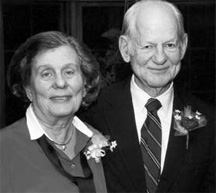Donor Profile: Otto & Jane Morningstar
Otto ’39 and Jane Morningstar
The Morningstar Professorship & Morningstar Visiting Professorship
by Elizabeth Chadis // MIT Physics Annual 2005

Otto Morningstar came from Mobile, Alabama, with a love of science and a zeal for learning. At the age of eight, he set fire to his kitchen with his home-grown chemistry set. At 16, he entered Alabama Polytechnic Institute, now known as Auburn University. By good luck, grace, or both, he was discovered in college and encouraged to apply to MIT for graduate school.
Otto arrived at MIT in 1933 with a full scholarship to study physics. For Otto and Jane, it was a great time to be at MIT. Otto worked with Nobert Weiner, Robert Van de Graaff and Robley Evans. MIT President Karl Compton not only knew Otto by name but knew his area of research and thesis topic. Otto was always grateful to MIT and appreciative of his time in the Physics Department.
After Otto finished his doctorate, he and Jane were married and Otto went to work for a textile company in Georgia. In 1942, Otto was called into service and stationed at MIT where he was assigned to the chemical warfare research center. Afterward, he founded his own company, Morningstar Corporation. Morningstar Corporation was involved in the development of plastic reels for data processing tapes and systems for tape handling. As the company grew, so did the Morningstars’ support for the Institute.
In 1953, Otto and Jane established a scholarship fund to support physics majors. Over the years, they continued to support the fund. In time, it supported many undergraduate physics majors and even a graduate student in physics. Then, in 1996 they established the Otto and Jane Morningstar Professorship.
Fifty years after their first gift in support of physics students, the Department of Physics asked Jane and her children for help (Otto had died in 1999). Bob Jaffe, Morningstar Professor and former director of the Center for Theoretical Physics (now MIT Center for Theoretical Physics — a Leinweber Institute (CTP-LI)), needed to raise money to support a visiting professorship. Ashoke Sen, one of the leading theoretical physicists of our time, had been visiting MIT each spring. He would come from Allahabad, India, for two months of high activity in the CTP (now CTP-LI) and collaborations that often developed into research publications. The Department was afraid of losing him to another university if it didn’t find a way to formalize his status.
Jane, and her children, Betty and Dick, agreed to fund the Morningstar Visiting Professorship, thereby allowing the Physics Department to guarantee future collaboration with Ashoke Sen. The family feels their support for MIT is a tribute to Otto and to the legacy he left them: his commitment to scientific thought and research, his interest and gratitude to MIT, and his fundamental belief in philanthropy.